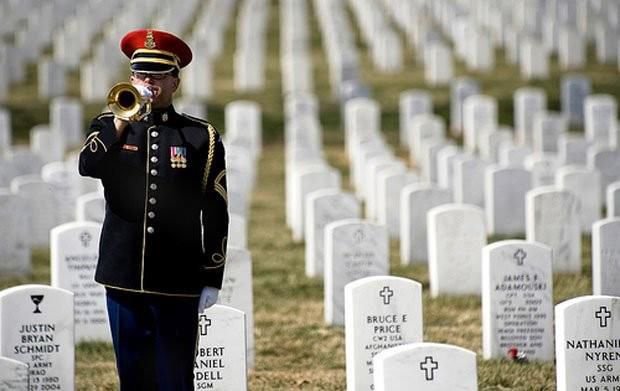"TAPS"
The 24-note melancholy bugle call known as “taps” is thought to be a revision of a
French bugle signal, called “tattoo,” that notified soldiers to cease an evening’s drinking
and return to their garrisons. It was sounded an hour before the final bugle call to end
the day by extinguishing fires and lights. The last five measures of the tattoo resemble
taps.
The word “taps” is an alteration of the obsolete word “taptoo,” derived from the Dutch
“taptoe.” Taptoe was the command — “Tap toe!” — to shut (“toe to”) the “tap” of a keg.
The revision that gave us present-day taps was made during America’s Civil War by
Union Gen. Daniel Adams Butterfield, heading a brigade camped at Harrison Landing,
Va., near Richmond. Up to that time, the U.S. Army’s infantry call to end the day was
the French final call, “L’Extinction des feux.” Gen. Butterfield decided the “lights out”
music was too formal to signal the day’s end. One day in July 1862 he recalled the
tattoo music and hummed a version of it to an aide, who wrote it down in music.
Butterfield then asked the brigade bugler, Oliver W. Norton, to play the notes and, after
listening, lengthened and shortened them while keeping his original melody.
He ordered Norton to play this new call at the end of each day thereafter, instead of the
regulation call. The music was heard and appreciated by other brigades, who asked for
copies and adopted this bugle call. It was even adopted by Confederate buglers.
This music was made the official Army bugle call after the war, but not given the name
“taps” until 1874.
The first time taps was played at a military funeral may also have been in Virginia soon
after Butterfield composed it. Union Capt. John Tidball, head of an artillery battery,
ordered it played for the burial of a cannoneer killed in action. Not wanting to reveal the
battery’s position in the woods to the enemy nearby, Tidball substituted taps for the
traditional three rifle volleys fired over the grave. Taps was played at the funeral of
Confederate Gen. Stonewall Jackson 10 months after it was composed. Army infantry
regulations by 1891 required taps to be played at military funeral ceremonies.
Taps now is played by the military at burial and memorial services, to accompany the
lowering of the flag and to signal the “lights out” command at day’s end.
( )
)
I lost my father in 2011, and at his funeral taps was played and a flyer was given to all those who attended. On the flyer was this very story for all to know the history of taps. Thank you dad for sharing this with all who were there, that we may share it with those whom we come in contact with.
I miss you and Love you,
your son pj
(source: U.S. dept. V.A.)
Congratulations @fotojunky! You have completed some achievement on Steemit and have been rewarded with new badge(s) :
Click on any badge to view your own Board of Honor on SteemitBoard.
For more information about SteemitBoard, click here
If you no longer want to receive notifications, reply to this comment with the word
STOPYay! :)
Hi! I am a robot. I just upvoted you! I found similar content that readers might be interested in:
http://www.va.gov/opa/publications/celebrate/taps.pdf
Thanks @cheetah. :)
Congratulations @fotojunky! You have received a personal award!
Click on the badge to view your Board of Honor.
Do not miss the last post from @steemitboard:
SteemitBoard World Cup Contest - Semi Finals - Day 1
Participate in the SteemitBoard World Cup Contest!
Collect World Cup badges and win free SBD
Support the Gold Sponsors of the contest: @good-karma and @lukestokes
Congratulations @fotojunky! You received a personal award!
You can view your badges on your Steem Board and compare to others on the Steem Ranking
Vote for @Steemitboard as a witness to get one more award and increased upvotes!